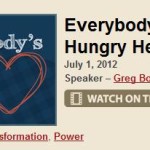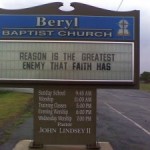We run our website the way we wished the whole internet worked: we provide high quality original content with no ads. We are funded solely by your direct support. Please consider supporting this project.
Trusting God for the Wrong Things
Chloe was a smart, personable, and devoted Christian student from South America whom I had the pleasure of teaching in several theology classes. In one meeting, Chloe confessed that, despite the confident appearance that she projected, she actually lived with a sense of guilt and had never felt like a good Christian. In fact, Chloe said she had never been confident she was “truly saved.” She knew that salvation is based on our faith, and she knew that the essence of faith is trust. But trusting God was something Chloe said she always struggled with. “Everyone else at this college seems to trust God for everything in their life,” she said, “but I just can’t!”
Chloe seemed baffled when I asked her what she felt she was supposed to trust God for. “You know,” she said, “I’m supposed to trust God to bring the right man into my life to be my husband, and I’m supposed to trust that he’ll lead us into the right ministry together and that he’ll bless and protect our family.”
“Protect?” I asked. “As in, protect your children?” We sat in silence for a moment before I continued. “You’re having trouble trusting God to protect your children… as in, protect them from things like child molesters?” Tears began to well up in Chloe’s eyes, as she had shared with me in previous meetings about personal experiences around this issue. I leaned forward, grabbed Chloe’s hand, and said, “Chloe, maybe it’s time to stop beating yourself up for not trusting God for something you already know he can’t be trusted for. If God didn’t protect you when you were nine, it’s little wonder you have trouble trusting him to protect you and your future children when you’re twenty.”
Chloe was stunned. I had broken an unacknowledged rule among Christians like Chloe who try to find security in the magical promise that, if they can just “trust and obey,” God will bless them and protect them and their children. The unspoken rule is, don’t notice the obvious. And the obvious reality no one is supposed to notice is that the magical formula contradicts the way the world actually is.
At one point in Job’s dispute with his “friends,” Eliphaz rhetorically asks Job, “Who, being innocent, has ever perished? Where were the upright destroyed?” (Job 4:7). Only a person who wore magical glasses that deleted out innocent people perishing and upright people being destroyed could ever say something so absurd. Anyone looking at the world with any degree of objectivity sees that innocent and righteous people perish and are destroyed as routinely as guilty and unrighteous people.
This is a scary world to confront, however. We would all feel more secure if we could trust that the world is actually fair and that we will be spared its random nightmares if we just “trust and obey.”
Living under the illusion that trusting God about such matters ensures our safety allows some people to enjoy a false sense of security, but as Chloe’s story illustrates, it can also be a source of tremendous pain. Many struggle, as Chloe did, with guilt and doubt simply because their own experience refutes this magical worldview. Though they may not break “the rule” by admitting the obvious, they know, on some level, that there are a multitude of variables other than God’s will or our own faith that influence what happens to children, marriages, careers, finances, health, and every other aspect of our lives.
As much as we might wish it were otherwise, the truth is that in an unfathomably complex world in which every human and angelic decision ever made exercises an ongoing influence on what comes to pass, there is no magical formula that can guarantee things will turn out one way rather than another. To try to find security in anything outside God’s character is to reflect both a lack of understanding and a lack of trust. It is to treat God’s covenant promises as if they were contractual deals.
—adapted from Benefit of the Doubt, pages 223-224, 230
Category: General
Tags: Benefit of the Doubt, Doubt, Faith, The Book of Job, Trust
Topics: Apologetics, The Problem of Evil
Related Reading

Leaving Westboro Baptist: Damsel, Arise
Burstein! via Compfight A reader pointed us to this fascinating article about the defection of Megan Phelps-Roper from the notorious Westboro Baptist Church (Thanks Rocky). She’s the granddaughter of the founder and preacher Fred Phelps. It’s an amazing story of how sometimes doubt can lead to grace and courage. From the article: In the fifth…

A Rational Defense of Belief in God
The New York Times recently posted a review of Alvin Plantinga’s book, Where the Conflict Really Lies: Science, Religion, and Naturalism. In it, Plantinga argues on philosophical grounds that, among other things, theism is not in conflict with science, that a belief in naturalism along with evolution is contradictory, and that “Faith…is another basic way of forming beliefs, distinct…

Everybody’s Got A Hungry Heart [Sermon, 7/1/12]
Check out Greg’s latest sermon!
Description from WHC website:
Paul wrote the Colossians to confront a false religion of invoking angels. These invocations were being done because people thought Jesus wasn’t enough. This same type of thought pervades our own society, where people with hungry hearts are searching for more than what Jesus offers. In this sermon, Greg talks about the fullness that Jesus brings.

The Evangelical Mind
Peter via Compfight As a follow-up to Rachel Held Evans’ thoughts yesterday on the Scandal of the Evangelical Heart, we thought we would post this reflection by Peter Enns about the Deeper Scandal of the Evangelical Mind. He claims that in the current environment when professors and pastors are constrained by the consequences of asking…

Part Three of Greg’s Interview with David D. Flowers
Here’s the final interview that Greg did with David D. Flowers in which he discusses his upcoming book Benefit of the Doubt: Dismantling the Idol of Certainty. Check it out! From the interview: Faith in Scripture isn’t about striving for certainty: it’s about being willing to commit to a course of action — to a way…


